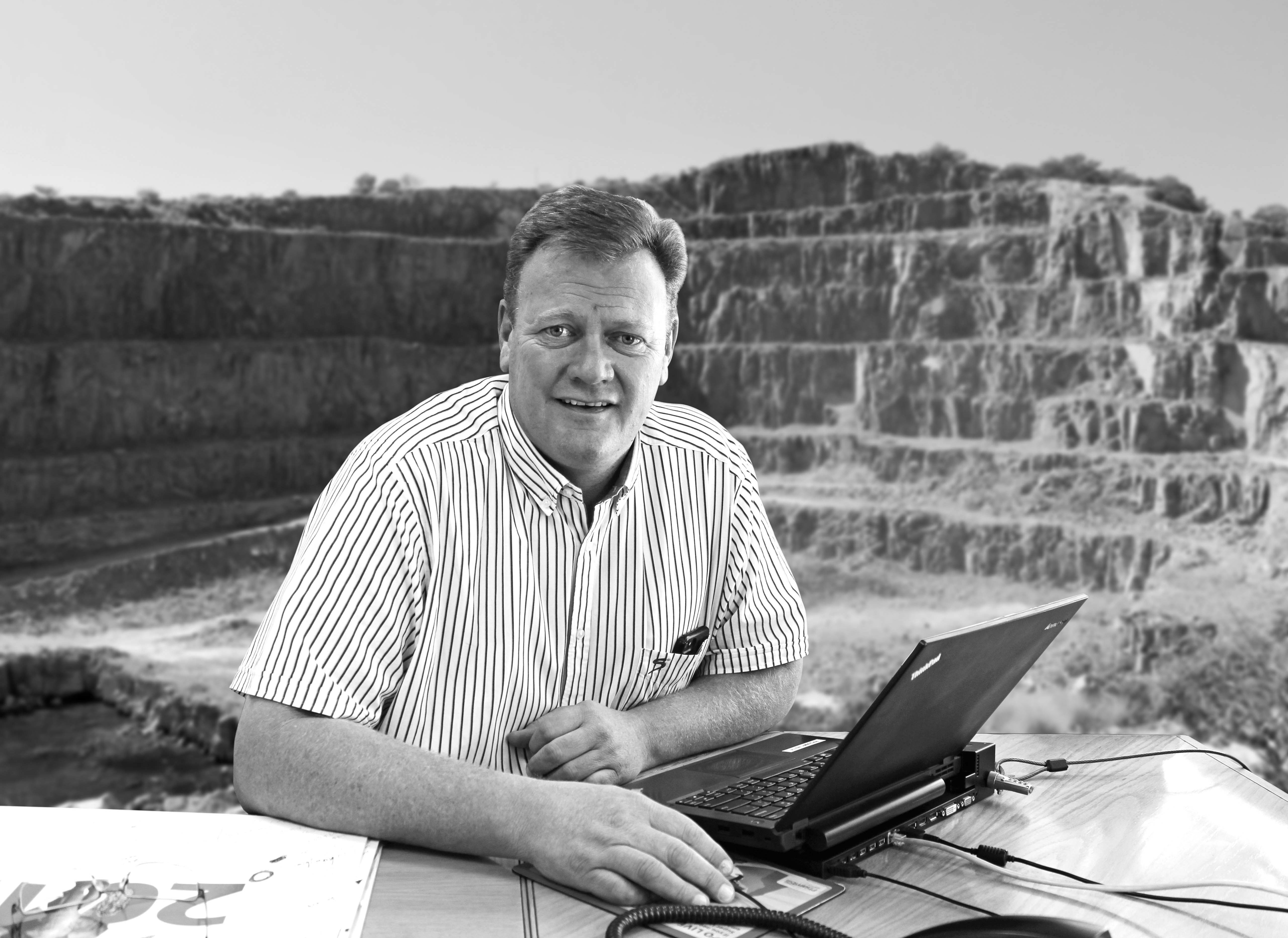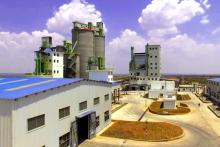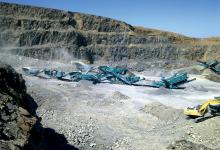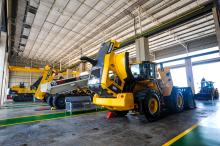
Armed with 25 years’ aggregates and mining experience, Riaan Redelinghuys has successfully steered construction materials supplier, PPC, to the summit of Botswana’s aggregates market. Munesu Shoko reports.
“One of the contributing factors to the immediate growth of our aggregates business is the fact that cement and aggregates are directly related, and no cement is used without an aggregate in one way or form”
The name PPC is synonymous with cement production in the African marketplace. Rightly so, because historically PPC was only a cement and lime producer. However, since 1996 the company has gradually entered the aggregates industry, investing in the acquisition of various existing quarrying operations, initially in South Africa, where Mooiplaas Quarry remains its flagship operation, before casting its acquisition net wider into Botswana eight years later.
In Botswana, PPC acquired 100% of Kgale Quarries, strategically located some 3km from the centre of the capital, Gaborone, in 2004, before expanding its foothold with the acquisition of Quarries of Botswana’s three operations, spread across Francistown, Mokolodi and Selebi-Phikwe, in 2011.
Although PPC was largely a cement company at the time of these acquisitions, the technical and general operational knowledge, as well as high company standards, ensured the immediate success of the company’s ventures in the aggregates industry. As part of the growth strategy, PPC went on to form a materials division in 2016 that consolidates its aggregates, ready-mixed, lime and fly ash businesses. The establishment of a dedicated materials division is testimony to the big emphasis on growing the construction materials side of the business.
However, having solid strategies in place is one thing, but being able to effectively execute the plans is quite another. Successful execution of any significant strategic plans calls for a combination of initiatives, but good leadership is a key component to effectively overseeing the crucial leg of any strategy - implementation. For PPC Botswana’s aggregates business, Riaan Redelinghuys, executive for the aggregates division, has brought much-needed aptitude to steer the business to greater heights.
Redelinghuys, an industrial engineer by profession, has 25 years of aggregates and mining experience, which also includes underground coal mining. During the 14.5 years of his PPC career, he has held several senior roles, including production manager for PPC’s Mooiplaas Quarry in South Africa and operations manager for aggregates, before assuming his current role of executive for aggregates.
To date, he has led PPC from being a minority aggregates supplier to becoming the leading supplier in Botswana, a country that enjoys a great deal of both political stability and resultant economic growth in southern Africa.
Through fiscal discipline and sound management, Botswana has transformed itself from being one of the poorest countries in the world to a middle-income country with a per capita GDP of about US$18,000 in 2017. The country’s economic growth of about 4.5% in 2017 and increasing foreign reserves to about 45% GDP mean that it is one of the very few economies in this part of the world enjoying a positive economic spell.
Infrastructure development has taken centre stage in recent years, with a number of flagship projects being executed. Through its existing cement facility in Botswana and the strategic acquisitions of aggregates operations in all the strategic developmental areas, PPC has positioned well to make the most of the infrastructure rollout programme.
“One of the contributing factors to the immediate growth of our aggregates business is the fact that cement and aggregates are directly related, and no cement is used without an aggregate in one way or form,” says Redelinghuys.
“PPC Botswana owns a cement blending, packaging and distribution facility located in Gaborone,” says Redelinghuys, giving a detailed structure of the company’s operations in the country. “We have three aggregates operations that report to me as the executive responsible for PPC Aggregates, with clear, defined synergies with our cement business, including shared services such as finance, administration and human resources, as well as sales and marketing.”
PPC Aggregates employs a strong workforce of 90 permanent staff, while PPC Botswana, the cement arm of the business, has about 50 employees on its books. With a steady stream of demand for its extensive range of granite products from the civil construction industry, including large construction concerns, as well as ready-mixed concrete producers, brick manufacturers and road construction projects, Kgale Quarries produces about 750,000tonnes/year of material.
Elsewhere, Mokolodi Quarries produces over 250,000tonnes/year of material, but Redelinghuys tells Aggregates Business International that there is the intent to more than double the current production capacity in the short term.
Meanwhile, Francistown is a 300,000tonnes/year operation. “Our business is driven by the general construction industry in Botswana, through normal segments such as readymix concrete and concrete product manufacturers. To an extent, government’s infrastructure rollout programme, mainly driven by road construction, as well as private investment into building projects, are key contributors to our business growth,” explains Redelinghuys.
To further emphasise PPC’s leading position in the Botswana aggregates market, Redelinghuys spells out some of the monumental projects the company has supplied material to in recent years. “We have supplied products for major road construction projects in the country over the years. The flagship ones that come to mind include the Francistown-Tonota Road and the Gaborone-Molopolole Road. We are currently busy supplying phase 1 of the Boatle-Ramotswa Road project,” he says.
The projects mentioned are flagship schemes in the history of Botswana. Representing an investment of about 1 billion Pula (about US$101-million), Botswana’s A1 national road between Tonota and Francistown went through a major upgrade back in 2014 to transform it from a single-lane section into a north- and southbound dual carriageway, crossing four existing river bridges along the way. A strategically important transportation route for both Botswana and the southern African region, the A1 passes through Francistown, the nation’s second largest city, heading northwards to end at the Zimbabwean border, some 90km in distance. From there, commercial traffic continues on to destinations that include Zambia and the Democratic Republic of Congo.
PPC Aggregates is currently supplying material to yet another milestone project in Botswana, the Boatle-Ramotswa Road project. The reconstruction of the road is meant to defuse traffic congestion along a section of the main A1 Road. The scope of works includes the upgrading of the existing part of the road from a single carriageway to a dual carriageway with associated geometric improvements including an interchange at Boatle Junction.
“We have also supplied material to several other mammoth structures in Botswana, including the SADC House, the iconic iTowers, Riverwalk Mall, Sir Seretse Khama International Airport, Game City Mall as well as Molapo Crossing Mall. We have also participated in the construction of some of the largest dams in the country, including Thune, Dikgatlhong and Lotsane,” says Redelinghuys.
Looking ahead, Redelinghuys says the goal is to maintain and consolidate presence in the general construction market in Botswana. “Like any other business, we are continuously looking at growing our market share in the country. We continuously strive to position PPC as a preferred local supplier of material solutions to the basic services sector. We do this by going beyond just supplying product and service, but providing customer-centred solutions,” he says.
He is of the view that the company’s current infrastructure puts it in a position to reap more business opportunities in the country, while helping Botswana to further build its much-needed infrastructure projects. In the short term, Redelinghuys expects to see a marginal business improvement this year, going into 2019, compared with previous years.







